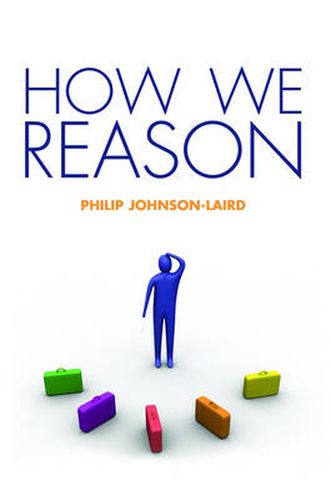Readings Newsletter
Become a Readings Member to make your shopping experience even easier.
Sign in or sign up for free!
You’re not far away from qualifying for FREE standard shipping within Australia
You’ve qualified for FREE standard shipping within Australia
The cart is loading…






Good reasoning can lead to success; bad reasoning can lead to catastrophe. Yet, it’s not obvious how we reason, and why we make mistakes - so much of our mental life goes on outside our awareness. In recent years huge strides have been made into developing a scientific understanding of reasoning. This new book by one of the pioneers of the field, Philip Johnson-Laird, looks at the mental processes that underlie our reasoning. It provides the most accessible account yet of the science of reasoning. We can all reason from our childhood onwards - but how? ‘How we reason’ outlines a bold approach to understanding reasoning. According to this approach, we don’t rely on the laws of logic or probability - we reason by thinking about what’s possible, we reason by seeing what is common to the possibilities. As the book shows, this approach can answer many of the questions about how we reason, and what causes mistakes in our reasoning that can lead to disasters such as Chernobyl. It shows why our irrational fears may become psychological illnesses, why terrorists develop ‘crazy’ ideologies, and how we can act in order to improve our reasoning.The book ends by looking at the role of reasoning in three extraordinary case histories: the Wright brothers’ use of analogies in inventing their flyer, the cryptanalysts’ deductions in breaking the German’s Enigma code in World War II, and Dr. John Snow’s inductive reasoning in discovering how cholera spread from one person to another. Accessible, stimulating, and controversial, How we Reason presents a bold new approach to understanding one of the most intriguing facets of being human.
$9.00 standard shipping within Australia
FREE standard shipping within Australia for orders over $100.00
Express & International shipping calculated at checkout
Good reasoning can lead to success; bad reasoning can lead to catastrophe. Yet, it’s not obvious how we reason, and why we make mistakes - so much of our mental life goes on outside our awareness. In recent years huge strides have been made into developing a scientific understanding of reasoning. This new book by one of the pioneers of the field, Philip Johnson-Laird, looks at the mental processes that underlie our reasoning. It provides the most accessible account yet of the science of reasoning. We can all reason from our childhood onwards - but how? ‘How we reason’ outlines a bold approach to understanding reasoning. According to this approach, we don’t rely on the laws of logic or probability - we reason by thinking about what’s possible, we reason by seeing what is common to the possibilities. As the book shows, this approach can answer many of the questions about how we reason, and what causes mistakes in our reasoning that can lead to disasters such as Chernobyl. It shows why our irrational fears may become psychological illnesses, why terrorists develop ‘crazy’ ideologies, and how we can act in order to improve our reasoning.The book ends by looking at the role of reasoning in three extraordinary case histories: the Wright brothers’ use of analogies in inventing their flyer, the cryptanalysts’ deductions in breaking the German’s Enigma code in World War II, and Dr. John Snow’s inductive reasoning in discovering how cholera spread from one person to another. Accessible, stimulating, and controversial, How we Reason presents a bold new approach to understanding one of the most intriguing facets of being human.